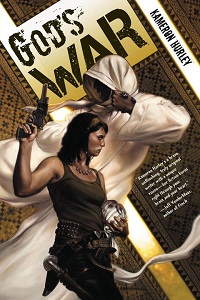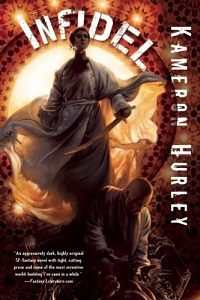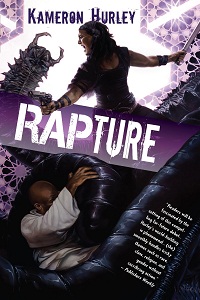Nyx sold her womb somewhere between Punjai and Faleen, on the edge of the desert. (Hurley, God’s War, 1.)
God’s War, the first volume of Hurley’s Bel Dame Apocrypha trilogy, opened with blood and violence and a kind of desperate amorality. So too does Rapture, the trilogy’s conclusion: but the blood and violence has aged with our protagonist, Nyxnissa so Dasheem, and matured. If Infidel, the second volume, improved a dozen times on God’s War, Rapture improves a good half-dozen on Infidel: this brutal, complex, morally grey novel is an unexpectedly brilliant capstone to one of the freshest approaches to science fiction I’ve read in recent years.
Spoilers for Rapture ahead.
The never-ending war between Nasheen and Chenja might be over at last, but Nasheen is on the brink of civil war, its political tensions exacerbated by the flood of unemployed and unemployable soldiers brought home by peace. A peace not everyone desires. Nyx, forced out of exile and retirement by the sisterhood of assassins she once belonged to, is compelled to track down a kidnapped politician. Alive, he’s dangerous; dead, he could trigger a bloody coup and the resumption of war. There are aliens in the skies, and the scent of revolution on the ground – and not in Nasheen alone, for in Ras Tieg Nyx’s former associate Inaya has made herself the center of a shapeshifter rebellion.
With a ramshackle team of down-at-heel mercenaries, few with any cause to trust or follow her except for the money, and with a bel dame assassin and a mad magician for her guides, Nyx sets out across a perilous, flesh-eating desert towards the edge of the world to rescue a man she once left for dead. She knows she’s being used. She doesn’t know excellent how.
 Hurley writes ferocious, uncompromising action, but she’s also developing a very strong hand with character beats. Rapture is the culmination of arcs of growth that have been progressing since the early pages of God’s War, incremental acts and decisions paying off in sometimes surprising ways. Bad decisions, too: there is an element, as Marissa Lingen noted, of “Let’s get the band back together in order to kill them horribly.”
Hurley writes ferocious, uncompromising action, but she’s also developing a very strong hand with character beats. Rapture is the culmination of arcs of growth that have been progressing since the early pages of God’s War, incremental acts and decisions paying off in sometimes surprising ways. Bad decisions, too: there is an element, as Marissa Lingen noted, of “Let’s get the band back together in order to kill them horribly.”
No, not everyone dies – but this isn’t a book where everyone lives, either. Throughout this trilogy, Hurley appears to have been developing a thematic argument about the ethical possibilities open to people living in a world riven by violence, where long-term survival relies in large part on luck and selfishness. Or on being able to profit from someone else’s violence. Even the landscape is inimical, filled with things that can kill inevitably, or unexpectedly: to disdain the violence that keeps you alive, or healthy, or wealthy, is to slide towards the hypocritical.
There are three things I really enjoyed about this book. The first is the way in which it pays off two volumes of build-up – including the aliens from the first book and the politics from the second. The way the nations we’ve seen in the first two books are beginning to change.
The second thing I love about this book—about the whole trilogy—is Hurley’s organic take on future technology: insects. Bugs. Everything runs on insect power, and people eat them too. (These aren’t books for those squeamish about arthropods.)
 The third thing is character. Inaya, with her underground rebellion and backstabbing comrades and hard-fought self-denying pitiless ethics. Rhys, failed husband, a bit of a hypocrite, who wants nothing more than peace. Safiyah, a strange and ancient magician. Nyx, capable of turning off her affections and going back to war.
The third thing is character. Inaya, with her underground rebellion and backstabbing comrades and hard-fought self-denying pitiless ethics. Rhys, failed husband, a bit of a hypocrite, who wants nothing more than peace. Safiyah, a strange and ancient magician. Nyx, capable of turning off her affections and going back to war.
Nyx felt herself pulling away, boxing herself back up… It was easy to become everything she hated again. Remarkably, maddeningly easy. (Hurley, Rapture, 11)
None of them are particularly likeable characters. All of them are, I find, compelling.
It would be unfair of me to rave about Rapture and fail to note that from another perspective, the whole trilogy is potentially problematic: the Bel Dame Apocrypha is set largely in societies that draw on Islamic influences, and particularly in God’s War may be seen to condone the interpretation of an irreducible connection between Islam and violence. Having read the entire trilogy, I think otherwise*: but I suspect the combination of Islamic influences and brutality may result in problems for some readers.
*But my exposure to Islam is only that of an interested agnostic.
As for me, I’m enormously pleased with Rapture, and find it an excellent conclusion to an altogether satisfying trilogy. Kameron Hurley, I salute you – and look forward to seeing what you do next.
Nyx gazed out toward the horizon, and weighed her options. There was a lot of thinking a person could do, in the long pause between what was, and what could be. She remembered the starship, bursting apart in the sky. She had done her part to usher in twenty years of peace. What Nasheen did with it was up to Nasheen.
Now, she figured she’d either have a good tumble, or go down blazing. Either way, it was a fitting way to end things.
The rain stopped. A pity. She’d been hoping for a storm.
“I’m retired,” Nyx said—to the ocean, to the air, to Nasheen, to her visitor—and took her last drink. (Hurley, Rapture, 379.)
Liz Bourke is buried under a mountain of books. One day she may once again emerge. Find her on Twitter @hawkwing_lb.










